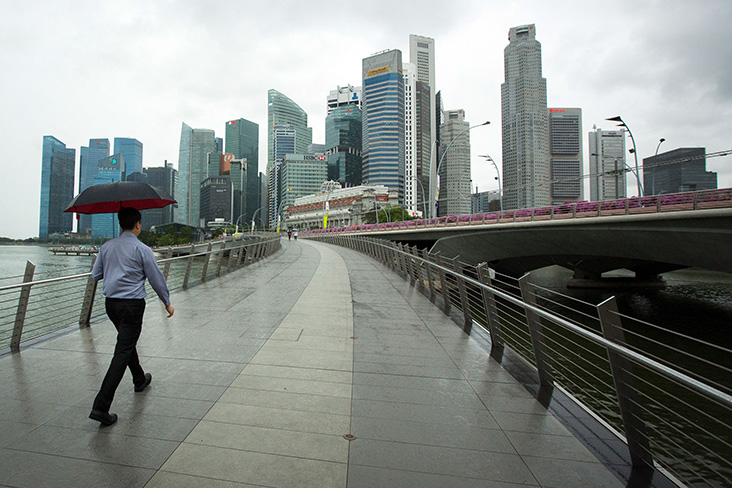Singapore will ensure its tax system is based on “solid” economic performance and the principle that higher income earners pay more, a senior government official said, after the prime minister signaled that the nation needs to prepare for tax increases.
“It must be all based on solid economic activity,” Indranee Rajah, senior minister of state for law and finance, said in an interview on Tuesday. She assessed that Singapore’s economy is "absolutely" in such a state now.
Singapore’s growth probably reached an almost four-year high of five percent in the third quarter, according to a Bloomberg survey ahead of a report due Thursday. Prime Minister Lee Hsien Loong said this week that 2017 growth could exceed three percent, higher than previously projected.
While she declined to comment on any specific changes to the goods and services tax that the government might be considering, Rajah said Singapore’s tax regime is backed by the principles of diverse revenue sources, a progressive system based on income, and economic growth. The GST system has been designed accordingly, she said.
The broad nature of the GST and the “offset packages” that have long been in place to assist lower-income residents with the consumption tax demonstrate how the system meets those principles, Rajah said.
Economists have identified the GST as one levy that Singapore could raise, as the city state balances the need for more revenue, maintaining its competitiveness, and concern that a tax increase could crimp household budgets. The GST was last revised in 2007, to seven percent from five percent.
The GST has cushioned Singapore’s economy in downturns and also has helped differentiate it from regional rival Hong Kong, which doesn’t have such a sales tax. These benefits are weighed against the prospect that businesses will view the city state as any less attractive for its higher levies.
“We’ve got to try and stay competitive, but at the same time, if you need to deal with expenditure for big items, you try and make sure your revenue streams are spread out across the board” and that assistance is provided for lower-income residents, Rajah said.
Prime Minister Lee said Nov. 19 he expected government spending on healthcare, infrastructure, and other social services to keep rising, meaning that “raising taxes is not a matter of whether, but when.”
Rajah named e-commerce as an area that would allow Singapore to further diversify its tax base.
“You can imagine, 20 years from now, the way people purchase is very different and by that time online platforms will be mainstays, so if that’s not part of the tax regime, there’s going to be a lot of holes there,” she said. This change should have been achieved “probably yesterday.”
Currently, online shoppers in Singapore generally aren’t taxed for their purchases, so long as the order doesn’t exceed 295 dollars, Rajah said.
The process by which Singapore might efficiently tax smaller orders could be complicated, with other countries such as Thailand openly considering such a levy and facing objections.
“Because it’s a new area, and you want to have a look at countries that have implemented it and you want to learn from them, it’s not something we’re going to rush into but it’s also not something you can put off for too long,” the minister said. “Do your shopping” now, she joked. – Bloomberg
Recommended stories:
